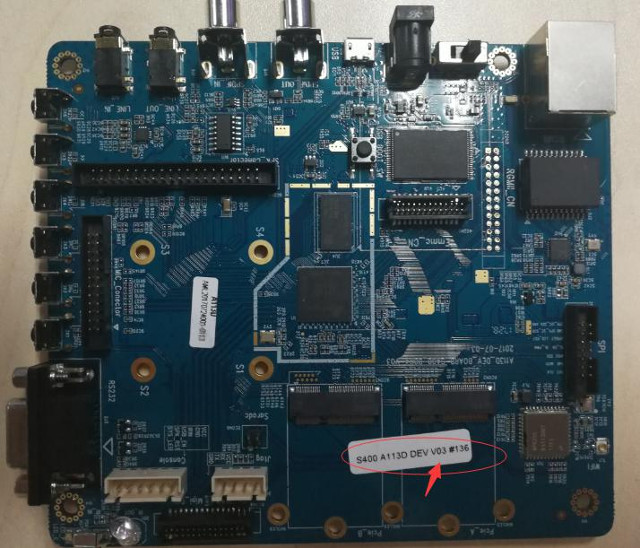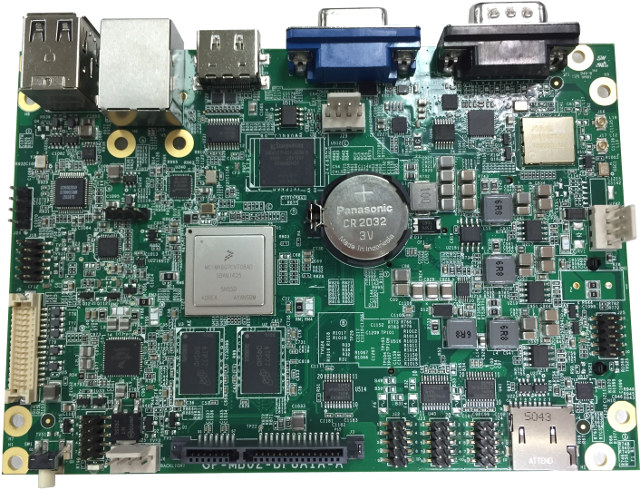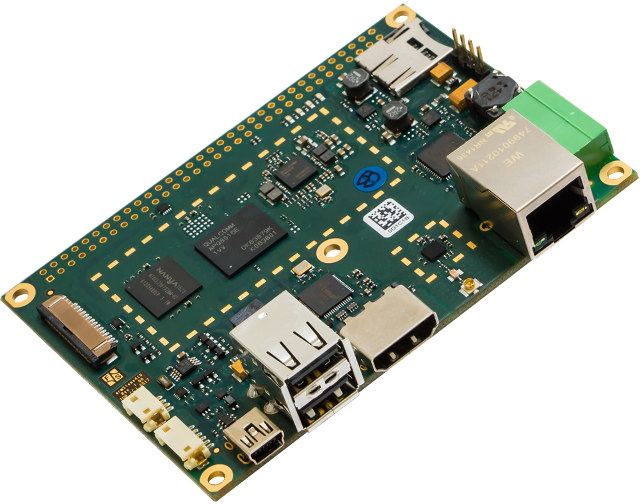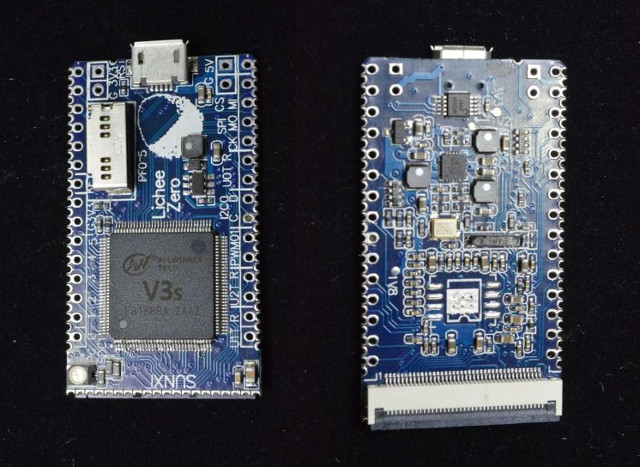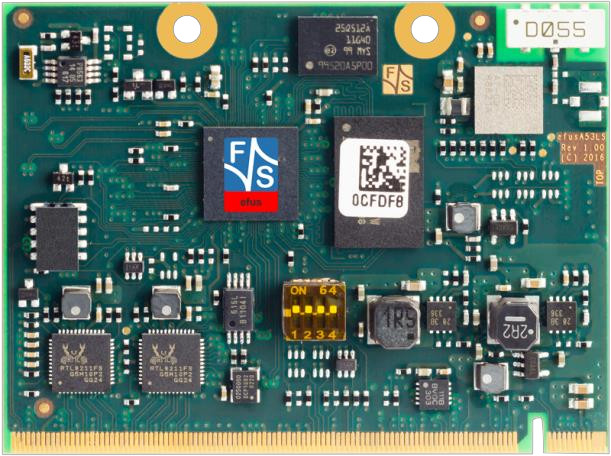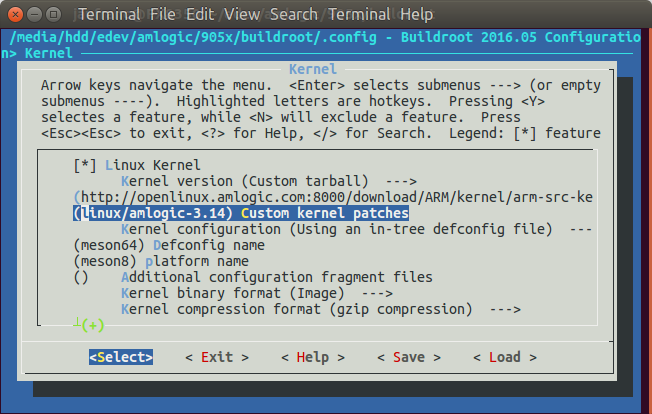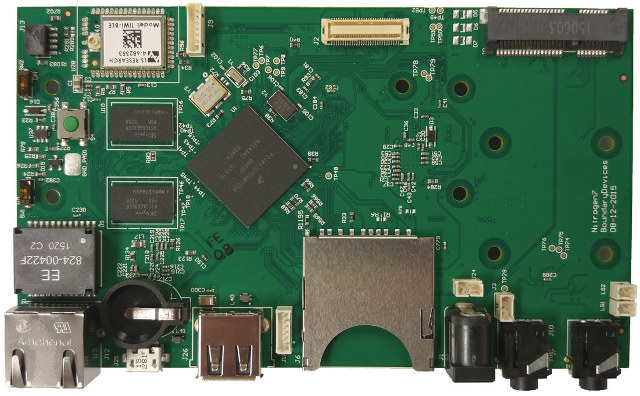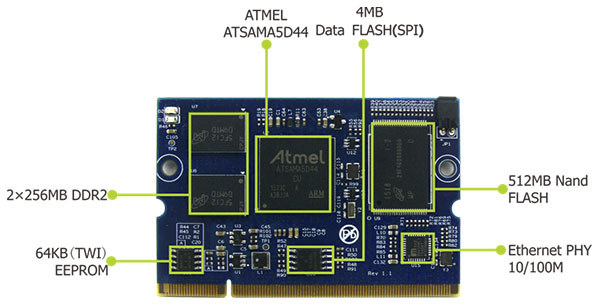Amlogic processors are mostly found in TVs and TV boxes, but the company is now apparently entering a new market with A111, A112, and A113 audio processors. I was first made aware of those new processors through Buildroot OpenLinux Release Notes V20170831.pdf document posted on their Open Linux website, where two boards with Amlogic A113D and A113X are shown. First, S400 board with the following key features/specifications: SoC – Amlogic A113D CPU System Memory – 1GB DDR3 Storage – 512MB SLC NAND flash Display I/F – MIPI interface Connectivity – Gigabit Ethernet SDIO WiFi/BT (AP6356S) Audio SPDIF_IN/SPDIF_OUT LINE_IN/LINE_OUT 2x Audio headers (MIC_Connector & SPK_Connector) USB – 1x USB 2.0 OTG Expansion – 2x PCIe ports Misc – 6x ADC Keys, IR_IN/IR_OUT, UART Interface (RS232) The second S420 board is based on A113X SoC, and comes with less features (no display, no Ethernet, no PCIe…), less memory: SoC – Amlogic A113X […]
NutsBoard Pistachio 3.5″ Embedded SBC is Powered by NXP i.MX 6Dual/Quad Processor
I don’t write about i.MX6 solutions much anymore, since there are so many options available on the market, but Pistachio SBC has been designed by a company I had never heard of before: NutsBoard, and they’ve released documentation and software publicly, which does not always happen in the industrial/embedded space. Pistachio single board computer specifications: SoC – NXP ARM Cortex-A9 IMX6 Quad/Dual @ 800MHz System Memory – Up to 2GB LPDDR3 Storage – 4GB eMMC flash, 1x SATA interface, 1x micro SD card slot Display I/F / Video Output 2x LVDS (6 or 8 bit) 1x 24-bit VGA output 1x HDMI port up to 1920×1080 (FHD) 1x I2C AR1021 touch controller Audio – SGTL5000 audio codec with class D amplifier; 1x audio header for speaker and microphone Connectivity – Gigabit Ethernet (Qualcomm AR8035), industrial grade wireless module (Jorjin WG7833) with dual band WiFi 802.11 a/b/g/n, Bluetooth 4.2 USB – 4x […]
F&S Elektronik armStone A53SD Pico-ITX SBC Features Qualcomm Snapdragon 410E Processor
F&S Elektronik Systeme GmbH will showcase their solutions at Embedded World 2017 next week, including their latest ARM Cortex A53 modules and boards based on NXP QorIQ LS1012A, and Qualcomm Snapdragon 410E processors. Today, I’ll write about the later with the company’s armStone A53SD pico-ITX single board computer equipped with up to 32GB flash and 8GB memory. armStone A53SD board specifications: Processor – Qualcomm Snapdragon 410E quad core ARM Cortex-A53 processor @ up to 1.2 GHz with Adreno GPU System Memory – Up to 8GB LPDDR3 RAM Storage – Up to 32GB eMMC flash, 1x micro SD card slot Display – 24-bit LVDS, DVI up to 720p, I2C for touch controller Audio – Line In/Out/Mic via header Connectivity – 1x 10/100M Ethernet, WiFi IEEE 802.11a/b/g/n, Bluetooth 2.1+EDR/4.1 LE USB – 3x USB 2.0 host ports, 1x USB 2.0 device port Camera – MIPI-CSI connector Expansion – Unpopulated 66-pin header with […]
$6 LicheePi Zero ARM Board Runs Linux 4.10, Supports Lots of Add-On Boards (Crowdfunding)
We’ve already covered LicheePi One board powered by Allwinner A13 processor, but it was not for sale out of China, and the developers are now back with LicheePi Zero board/module, slightly bigger than an SD card, featuring Allwinner V3s processor, and offered for as low as $6, or $8 with WiFi via an Indiegogo campaign. LicheePi Zero specifications: SoC – Allwinner V3s ARM Cortex A7 processor @ up to 1.2 GHz with an ARM Mali-400 GPU, 512Mbit (64MB) DDR2 on-chip Storage – micro SD card slot, SPI flash (not 100% clear if it will be populated when shipped to backers) Display – FPC40 RGB Connector with support for 800×480 RGB LCD Audio – Audio codec USB – micro USB OTG port Expansion 2x 15 headers with 2.54mm pitch, breadboard friendly with GPIOs, 2x UART, 1x SPI, 2x I2C,ADC, 1x PWM 2x 30 half-holes with 1.27mm pitch with OTG USB,MIPI CSI,EPHY,RGB […]
F&S Elektronik Introduces efus A53LS NXP QorIQ LS1012A System-on-Module for Communication & Networking Applications
NXP QorIQ LS1012A is a single core Cortex A53 communication processor that offers a 64-bit update to LS1021A dual core Cortex A7 processors found in gateways such as NXP LS1021A-IOTA IoT gateway reference design, and F&S Elektronik System has just launched efus A53LS system-on-module powered by the processor with up to 1GB RAM, up to 64SQPI NOR, access to the communication interfaces and peripherals from the processor via an efus compliant edge connector, and long term availability until 2030. efus A53LS COM specifications: Processor – NXP QorIQ Layerscape LS1012A single core ARM Cortex-A53 @ up to 800MHz System Memory – 512MB DDR3 by default, supports up to 1GB DDR3 RAM Storage – Up to 64MB QSPI NOR flash on-module, I/Os for SATA and SD card on edge connector Connectivity – 2x Realtek RTL8211F(N) Gigabit Ethernet transceiver chips, optional wireless module with dual WiFi IEEE802.11b/g/n/ac and Bluetooth 4.0 LE efus edge […]
Amlogic Releases Linux 3.14 Source Code for S905X, S905D, and S912 Processors, Has Started Working on Linux 4.4 / Android 7.0
Amlogic has just released buildroot with Linux 3.14 with support for Amlogic S905X (p212 board), S905D (p230 board), and S912 (Q200 board) processors, and the company appears to have started working on Linux 4.4 likely for future support for Android 7.0. You can check the source code as follows:
|
1 2 3 |
wget -c http://openlinux.amlogic.com:8000/download/ARM/filesystem/arm-buildroot-2016-08-18-5aaca1b35f.tar.gz tar xf arm-buildroot-2016-08-18-5aaca1b35f.tar.gz cd buildroot |
If you have the wrong toolchain the code won’t build (See comments section). So I installed several toolchains provided by Amlogic (all may not be needed) in /opt:
|
1 2 3 4 5 6 7 8 9 10 |
wget -c http://openlinux.amlogic.com:8000/deploy/gcc-linaro-aarch64-linux-gnu-4.9-2014.09_linux.tar wget -c http://openlinux.amlogic.com:8000/deploy/gcc-linaro-aarch64-none-elf-4.8-2013.11_linux.tar wget -c http://openlinux.amlogic.com:8000/deploy/gcc-linaro-arm-linux-gnueabihf.tar.gz wget -c http://openlinux.amlogic.com:8000/deploy/arc-4.8-amlogic-20130904-r2.tar.gz wget -c http://openlinux.amlogic.com:8000/deploy/CodeSourcery.tar.gz sudo tar xvf gcc-linaro-aarch64-linux-gnu-4.9-2014.09_linux.tar -C /opt sudo tar xvf gcc-linaro-aarch64-none-elf-4.8-2013.11_linux.tar.bz2 -C /opt sudo tar xvf arc-4.8-amlogic-20130904-r2.tar.gz -C /opt sudo tar xvf gcc-linaro-arm-linux-gnueabihf.tar.gz -C /opt sudo tar xvf CodeSourcery.tar.gz -C /opt |
I also downloaded a shell script to add the toolchains to my path:
|
1 2 |
wget http://openlinux.amlogic.com:8000/deploy/TOOLSENV.sh source TOOLSENV.sh |
Once toolchains are setup, you can select one of three boards config (Q200 / S912 as example) and start building the code:
|
1 2 3 |
sudo apt install build-essential make mesongxm_q200_release_defconfig make |
If you are interested in S905X or S905D instead, use respectively mesongxl_p212_release_defconfig or mesongxl_p230_release_defconfig. I built both S912:
|
1 2 3 4 5 6 7 8 9 10 11 12 13 14 15 |
ls -l output/images/ total 1338448 -rw-r--r-- 1 jaufranc jaufranc 20407939 Aug 30 13:44 boot.img lrwxrwxrwx 1 jaufranc jaufranc 54 Aug 30 13:44 dtb.img -> /home/jaufranc/buildroot/output/images/gxm_q200_2g.dtb -rw-r--r-- 1 jaufranc jaufranc 40521 Aug 30 11:34 gxm_q200_2g.dtb -rw-r--r-- 1 jaufranc jaufranc 16973552 Aug 30 11:34 Image -rw-r--r-- 1 jaufranc jaufranc 7002624 Aug 30 13:44 rootfs.cpio -rw-r--r-- 1 jaufranc jaufranc 3391430 Aug 30 13:44 rootfs.cpio.gz -rw-r--r-- 1 jaufranc jaufranc 3391494 Aug 30 13:44 rootfs.cpio.uboot -rw-r--r-- 1 jaufranc jaufranc 1073741824 Aug 30 13:44 rootfs.ext2 lrwxrwxrwx 1 jaufranc jaufranc 11 Aug 30 13:44 rootfs.ext4 -> rootfs.ext2 -rw-r--r-- 1 jaufranc jaufranc 176076800 Aug 30 13:44 rootfs.tar -rw-r--r-- 1 jaufranc jaufranc 67588619 Aug 30 13:45 rootfs.tar.gz -rw-r--r-- 1 jaufranc jaufranc 917504 Aug 30 13:42 u-boot.bin -rw-r--r-- 1 jaufranc jaufranc 918016 Aug 30 13:42 u-boot.bin.sd.bin |
and S905X images successfully:
|
1 2 3 4 5 6 7 8 9 10 11 12 13 14 15 |
ls -l output/images/ total 593932 -rw-r--r-- 1 jaufranc jaufranc 20408642 Aug 30 13:41 boot.img lrwxrwxrwx 1 jaufranc jaufranc 72 Aug 30 13:41 dtb.img -> /home/jaufranc/edev/amlogic/905x/buildroot/output/images/gxl_p212_2g.dtb -rw-r--r-- 1 jaufranc jaufranc 37278 Aug 30 12:08 gxl_p212_2g.dtb -rw-r--r-- 1 jaufranc jaufranc 16973552 Aug 30 12:08 Image -rw-r--r-- 1 jaufranc jaufranc 7002624 Aug 30 13:40 rootfs.cpio -rw-r--r-- 1 jaufranc jaufranc 3391580 Aug 30 13:41 rootfs.cpio.gz -rw-r--r-- 1 jaufranc jaufranc 3391644 Aug 30 13:41 rootfs.cpio.uboot -rw-r--r-- 1 jaufranc jaufranc 1073741824 Aug 30 13:41 rootfs.ext2 lrwxrwxrwx 1 jaufranc jaufranc 11 Aug 30 13:41 rootfs.ext4 -> rootfs.ext2 -rw-r--r-- 1 jaufranc jaufranc 230502400 Aug 30 13:41 rootfs.tar -rw-r--r-- 1 jaufranc jaufranc 90573453 Aug 30 13:41 rootfs.tar.gz -rw-r--r-- 1 jaufranc jaufranc 917504 Aug 30 13:39 u-boot.bin -rw-r--r-- 1 jaufranc jaufranc 918016 Aug 30 13:39 u-boot.bin.sd.bin |
Separately, you can also find buildroot for Linux 4.4, but […]
Boundary Devices Nitrogen7 Single Board Computer is Powered by NXP i.MX7 Processor
While several system-on-modules based on Freescale/NXP i.MX7 processor have been announced such as Compulab CL-SOM-iMX7, or TechNexion PICO-IMX7-EMMC, I had not seen many single board computers or development boards based on the new processor, apart from Freescale i.MX7 96Boards by Arrow Electronics which was scheduled for Q4 2015, but has yet to launch. Boundary Devices Nitrogen7 board is another option that’s available now (in limited quantities) with NXP i.MX7 Cortex A7+Cortex M4 processor, 1GB RAM, 4 to 64GB eMMC, wired and wireless connectivity, and expansion headers. Nitrogen7 board specifications: SoC – Freescale i.MX7 single or dual ARM Cortex-A7 processor @ up to 1GHz + ARM Cortex-M4 MCU + 2D graphics engine System Memory – 1GB DDR3L Storage – 4GB eMMC flash (expandable to 64GB), 2MB Serial NOR Flash, SD card slot Connectivity – 1x 10/100/1Gb Ethernet, WiFi 802.11 a/b/g/n, Bluetooth 4.1 (TiWi-BLE combo module) Display – 24-bit RGB (via expansion […]
MYiR Tech Introduces Atmel SAMA5D4 CPU Module and Development Board
MYiR Tech has launched a new development board – MYD-JA5D4X – featuring their Atmel SAMA5D4 Cortex A5 system-on-module called MYC-JAD5D4X with 512MB DDR2, 512MB Flash, and various ports such as Fast Ethernet, RS485, LCD panel interface, USB connectors and so on. Target applications include control panel/HMI, fitness equipment, smart grid infrastructure, communications gateways, and imaging terminals among others. Let’s start wit the MYC-JAD5D4X CPU module specifications: SoC – Atmel SAMA5D42 or SAMA5D44 ARM Cortex-A5 processor @ up to 600MHz (945DMIPS) with NEON and FPU, 720p hardware video decoder (SAMA5D44 only) System Memory– 512MB (2x 256MB) DDR2 SDRAM Storage – 512MB NAND Flash, 4MB Data Flash, 64KB EEPROM Connectivity – On-board Ethernet PHY I/Os via 200-pin SO-DIMM edge connector 2 x Ethernet 3 x USB2.0 Host 8 x Serial ports 4 x TWI, 3 x SPI 5 x 12-bit ADC 1 x SMD 4 x 4-bit SDIO 1 x LCD 1 x ISI 7 […]


